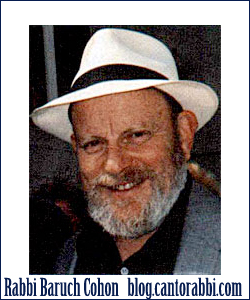NULL AND VOID — Kol Nidrey blog by Rabbi Baruch Cohon
Recently I heard someone refer to “Kol Nidrey,” the famous chant that opens the evening service of Yom Kippur, as “the most moving Jewish prayer of all.” Actually, Kol Nidrey is not a prayer at all. it is a legal formula. The elders of the congregation stand holding scrolls of the Torah, symbolizing a religious court, while the cantor chants the words that proclaim all our vows and oaths and prohibitions taken from this Yom Kippur until next Yom Kippur to be null and void. What does this do for us?
Realistically, the classic Aramaic text is recited in order to enable us to start the new year on as positive a basis as we can. But most members of most congregations don’t really listen to the words. They listen to the melody, and it truly is moving. As a vocal solo or a violin solo, as a choral climax or an orchestral highlight, it is unique. Over the yers, many cantors and many composers arranged it and contributed original touches, until what we have today is a composite masterpiece of Ashkenazi music. In the synagogue it is the reverse of most of our songs, because it is not an accompaniment to the words. Rather, the words are an accompaniment to the music. Jewish people speak of going to services to “say Shma” or to say or sing “Avinu Malkeynu.” But on Yom Kippur Eve they go to services to “hear Kol Nidrey.”
Historically the words presented a serious problem. Anti-semites used them to argue that a Jew’s word cannot be trusted since he declares it “null and void” in advance. Some rabbis tried to ban Kol Nidrey. But the people loved it. Other rabbis — incuding my father of blessed memory — wrote alternate words, in English or Hebrew instead of Aramaic. Those words presented no problem, because they specified vows to G-d, which Yom Kippur atones for if we fail to keep them. But those lyrics never caught on, because they sounded different. The people wanted to hear the sound of the old Aramaic words, whether they understood them or not. And so Kol Nidrey lives on, resounding through the generations.
The style of this unique melody contrasts dramatically with today’s camp-tune songs. Some communities lack the kind of voice to interpret Kol Nidrey. But hey — Jan Peerce’s record is available. And for more traditional congregations, whoever is functioning as a High Holiday cantor will do his best to sing Kol Nidrey, and to build it to a great effect. Certainly the opportunity is there. After all, it is chanted three times!
So don’t miss Kol Nidrey this Friday evening. A once-a-year treat. Let it help you start a good year.
You can contact Rabbi Baruch Cohon for further discussion and/or comments at: baruch.c.2011@gmail.com


